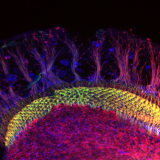The Australian Government is now in caretaker period. During this time, updates on this website will be published in accordance with the Guidance on Caretaker Conventions, until after the election.
National Health and Medical Research Council (NHMRC) understands the importance of engaging with consumers and the community on its role and activities, whilst also providing leadership and guidance to the health and medical research sector on the meaningful engagement of consumers throughout all stages of research and health care.
NHMRC has a statutory responsibility under the NHMRC Act 1992 (the Act) to raise the standard of individual and public health throughout Australia, and foster the development of consistent health standards between the various states and territories.
The functions undertaken by NHMRC in executing these responsibilities are outlined in Section 7(1)(a) of the Act. NHMRC inquires into, issues guidelines on, and advises the community on, matters relating to:
- the improvement of health
- the prevention, diagnosis and treatment of disease
- the provision of health care
- public health research and medical research
- ethical issues relating to health.
There is significant interest from individuals and groups within the Australian community on how NHMRC carries out its legislated functions. NHMRC understands the importance of engaging with consumers and the community to the successful performance of our functions. The following are some examples of NHMRC's engagement with consumers and the community.
Public consultation
Public consultation is an important mechanism by which NHMRC engages with the Australian community. Section 3(2) of the Act states:
It is the intention of the Parliament that, to the extent that it is practicable to do so, the NHMRC should adopt a policy of public consultation in relation to individual and public health matters being considered by it from time to time.
As directed in Section 3(2) of the Act, NHMRC adopts a policy of public consultation in relation to individual and public health matters it considers. All Guidelines developed by NHMRC undergo a period of public consultation prior to consideration by Council.
Section 13 of the Act outlines the process that the Council or Committee must follow:
- draft guidelines must be prepared
- a notice must be published containing a summary of the draft guidelines, stating where the draft guidelines can be obtained and inviting submissions within a specified timeframe
- due consideration must be given to consultation submissions.
The NHMRC Regulations 2006 require that public consultation runs for a minimum of 30 days.
Specific requirements for consumer and community engagement apply during the development of the clinical practice guidelines. NHMRC's requirements are detailed in the publication Procedures and requirements for meeting the 2011 NHMRC standard for clinical practice guidelines, which requires that, to meet the NHMRC standard, clinical practice guidelines must 'be developed by a multidisciplinary group that includes relevant experts, end users and consumers affected by the clinical practice guideline'.
Representation on NHMRC committees
The Council and Principal Committees of NHMRC are established under Sections 20 and 35 of the Act respectively. Under the Act the Minister must establish Principal Committees called the Research Committee and the Australian Health Ethics Committee. The Minister may also establish such other Principal Committees the Minister thinks are necessary to assist Council to carry out any of its functions.
Consumer and community representatives are routinely appointed to NHMRC Council and Principal Committees and, where appropriate, working committees established under section 39 of the Act. Further information on the functions and membership of all NHMRC committees is available on leadership and governance.
Consumer and Community Advisory Group
The NHMRC Consumer and Community Advisory Group (CCAG) provides strategic advice to NHMRC's Chief Executive Officer on health matters and on health and medical research matters from a consumer and community perspective.
CCAG plays an important role in providing a consumer and health community perspective on a diverse range of NHMRC business, including advice on consumer and community involvement in health and medical research.
Further information on CCAG is available on Consumer and Community Advisory Group.
Peer review
Since 2017, NHMRC has been trialling the involvement of consumer and community reviewers in peer review for selected grant opportunities. A person who has direct knowledge of the lived experience of a certain health condition, an advocate or a carer may be appointed to a peer review panel as a consumer or community peer reviewer (depending on the nature of the grant opportunity). Consumer/ community peer reviewers are not involved in the formal scoring of applications; however, feedback demonstrates the value of consumer and community participation in this core NHMRC process.
Further information on the NHMRC peer review system is available on peer review.
Guidance for consumer and community involvement in health and medical research
Statement on Consumer and Community Involvement in Health and Medical Research (2016)
In 2016, NHMRC and The Consumers Health Forum of Australia Ltd (CHF) released the Statement on Consumer and Community Involvement in Health and Medical Research (the Statement). The Statement's purpose is to guide research institutions, researchers, consumers and community members in the active involvement of consumers and community members in all aspects of health and medical research. The Statement was developed in recognition of the contribution that consumers can make to research, as well as their right to participate in research. The Statement replaced the joint NHMRC/CHF Statement on Consumer and Community Participation in Health and Medical Research (2002).
NHMRC and the CHF are currently reviewing the Statement.
Toolkit for Consumer and Community Involvement in Health and Medical Research (2020)
In 2020, NHMRC released a suite of resources related to consumer and community involvement in, and expectations of, health and medical research. The toolkit was developed in consultation with members of the Community and Consumer Advisory Group from the 2015 to 2018 and 2018 to 2021 triennia. The Toolkit complements the Statement by providing further detailed information and tools on five individual areas of interest:
- Expectations and Value – Framework for Effective Consumer and Community Engagement in Research
- Measuring Alignment with Consumer and Community Expectations in Research
- Measuring Effectiveness of Consumer and Community Involvement in Research
- Considering Impact of Research from a Consumer and Community Perspective
- Self-assessment of Consumer and Community Involvement in Research
NHMRC encourages researchers, research organisations, consumers and consumer/ community health organisations to take advantage of this Toolkit throughout all stages of research, including the planning and preparation of grant applications, conduct of research and the evaluation of outcomes.
These resources are available from the Downloads section below.
The following list of complementary and disease specific resources are useful as additional references and can be implemented alongside the Toolkit:
- Australian Clinical Trials Alliance – Consumer Involvement and Engagement Toolkit
- Cancer Australia – Consumer involvement toolkit
- National Mental Health Commission – Consumer and Carer Engagement: a Practical Guide
- NHMRC National Institute for Dementia Research – Becoming involved in research – A guide for people living with dementia, their care partners and family members (available under 'Downloads' below).
- Australian Healthcare and Hospitals Association – Experience Based Co-Design Toolkit
- Monash Partners – Consumer and Community Involvement
- Telethon Kids Institute – Planning for Consumer and Community Participation in Health and Medical Research – A practical guide for health and medical researchers, Consumer and Community Participation in Health and Medical Research – A practical guide for health and medical research organisations
- Government of Western Australia Department of Health – WA Aboriginal Health and Wellbeing Framework 2015–2030
- NHMRC – Engaging Aboriginal and Torres Strait Islander people in guideline development
- Western Australian Health Translation Network – Involving Consumers in Health and Medical Research
Australian Clinical Trials
The Australian Clinical Trials recognise the important role that clinical trials play in Australia, both in improving the health of all Australians and in the Australian economy. The website aims to provide reliable and up-to-date information and advice about clinical trials in Australia for the public, researchers and industry. For the public, the website provides easy to understand information about clinical trials in Australia and how to become involved in a clinical trial. For industry, it provides information on the advantages of conducting clinical trials in Australia. For researchers, it provides an overview of the legislative and regulatory environment and useful links.
The website is the result of the recommendations of the Clinical Trials Action Group, supported by the Australian Government Department of Industry, Innovation, Science, Research and Tertiary Education and NHMRC.
Values and integrity
NHMRC encourages and promotes ethical conduct in research and aims to maintain a strong integrity framework for research and guideline development. This strengthens the foundations of research and accurate guideline development and promotes community trust.
The Australian Code for the Responsible Conduct of Research (2018), the National Statement on Ethical Conduct in Human Research (2007 – updated 2018) and the Australian code for the care and use of animals for scientific purposes 8th edition (2013) provide a framework for the conduct of all research in Australia.


